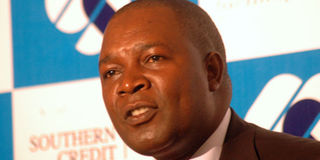CBK Governor survives House censure over shilling

Central Bank Governor Njuguna Ndung’u has survived parliamentary censure after MPs voted to delete his name from a committee report on the depreciating shilling March 7, 2012. FILE
What you need to know:
Central Bank Governor Njuguna Ndung’u has survived parliamentary censure after MPs voted to delete his name from a committee report on the depreciating shilling.
The move came on the third day of debate of the report of the House Committee that investigated the rapid decline of the shilling.
A total of 46 MPs voted to delete Prof Ndung’u’s hostile references, while 37 MPs voted to leave the report of the ad hoc committee, indicting Prof Ndung’u, intact.
The game-changer came when Joseph Gitari (Kirinyaga Central) proposed the amendment and was backed by Peris Simam (Eldoret South).
These two joined Chris Okemo (Nambale) and Boni Khalwale (Ikolomani) in clearing the adverse mentions of Prof Ndung’u regarding the way he had handled the depreciation of the shilling.
The eleventh hour amendment saw Parliament extend its sittings by 36 minutes—past its 6.30pm deadline-- but even so, it failed to conclude the debate of the report, and vote on its adoption or rejection.
There was controversy in the vote, as MPs contested that the results of the vote did not reflect the numbers of MPs in the House. Deputy Speaker Farah Maalim was forced to have a physical count. Mr John Mbadi (Gwassi), who had raised the queries about possible rigging was thus kicked out for Thursday's session for raising the false alarm.
Mr Okemo, the chairman of Parliament’s Finance Committee, who was co-opted in the shilling inquiry, said that though he attended only one meeting, he’d qualms with the conclusions of the report.
“When I look at the facts and I look at the conclusions, there’s a problem,” said Mr Okemo, a former Finance Minister. He defended the report saying that if the measures the CBK had taken to stem the free-fall of the shilling are rolled-back, then the depreciation of the shilling would return.
“We’re not out of the woods yet,” said the Nambale MP.
Before Mr Gitari stepped onto the podium, Dr Khalwale had hinted at the amendment saying the whole report could be thrown out if Prof Ndung’u’s name was retained in the report.
“My position on Prof Ndung’u is known and it was supported by the Cockar Commission (of inquiry into the secret sale of the Grand Regency Hotel),” said Dr Khalwale, who is also the chairman of Parliament’s Public Accounts Committee, which audits government spending.
The Ikolomani MP was of the view that because Prof Ndung’u had been indicted once, it was possible that another indictment would change nothing given that the people in power, who gave him the job in the first place, were unlikely to act.
“The governor must live with his conscience. Even if we pass this motion and say that he (the governor) should go (home); the same forces (that protected him in the first instance) are still in place,” said Dr Khalwale.
Jakoyo Midiwo (Gem), the joint government whip, added: “Governor Ndung’u is already condemned over the issue of Grand Regency. Whether you get rid of him now, or later, he’s already condemned”.
Mr Midiwo opposed the amendment to the report alongside Gwassi’s John Mbadi. They were both members of the ad hoc committee that investigated the slide of the Kenyan currency.
The opposition to the report saw MPs rekindle the discussion about unconstitutionality of some proposals, especially, those that seem to impinge on the independence of the Central Bank. But Committee chairman, Adan Keynan, said the same Constitution gave the people of Kenya, through their “democratically elected representatives” powers to check all State organs.
Manson Nyamweya (South Mugirango) and Thomas Mwadeghu (Wundanyi) all supported the ouster of Prof Ndung’u saying that he ought to take responsibility for the mess to the economy as a result of the rapid depreciation of the shilling.
Mr Nyamweya was Prof Ndung’u’s classmate in their undergraduate economic course, while Mr Mwadeghu is a former employee of the Central Bank. They took issue with the mismatch in lending rates, where the interbank rate was higher than the discount window, making banks access huge sums of cheap credit through the CBK window.
“Opening that window and allowing it to be misused, in economic terms, is equivalent to printing money,” said Mr Mwadeghu.
They said Prof Ndung’u had no business holding the reins at the Central Bank yet he had presided over such grave malfeasance to the economy.
“The captain of the Central Bank is one man –Prof Njuguna Ndung’u. The other day, Gor Mahia (football club) sacked their coach; Chelsea (football club) too sacked their coach for non-performance. What is wrong is saying that Prof Ndung’u should go?” posed Mr Nyamweya.
But those who backed Prof Ndung’u accused the committee of “zeroing in on one man”.
Mohamud Mohammed Ali (Moyale) said that while the House had a duty to keep the government in check, and the committee had found out that there was more to the decline of the shilling, apart from the inefficiency of the Central Bank.
The debate continues Thursday.




